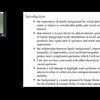marks

Markus Furendal
Markus Furendal is a researcher at the Department of Political Science at Stockholm Unviersity, and at the Institute for Futures Studies. He conducts resarch on topics at the intersection of politics,

Mark Budolfson
Mark Budolfson is an Associate Professor in the Department of Philosophy, the Department of Geography and the Environment, and the Population Wellbeing Initiative, University of Texas at Austin. He wo
Research seminar with Markus Furendal & Martin O'Neill
Place: At the Institute for Futures Studies, Holländargatan 13, Stockholm, or online. REGISTER HEREResearch seminar with Markus Furendal, Post-Doc in Political Science, Stockholm University, and Martin

Markus Jäntti: Trends in absolute intergenerational income mobility in Sweden
Markus Jänttis research centers on income inequality, poverty, socio-economic mobility, and wealth inequality, especially in a cross-national perspective. He teaches econometrics and methods for inequ
The Complexity of Mental Integer Addition
in: Journal of Numerical Cognition, Volume 6 (1). AbstractAn important paradigm in modeling the complexity of mathematical tasks relies on computational complexity theory, in which complexity is measur
Markus Jäntti: Trends in absolute intergenerational income mobility in Sweden
Markus Jänttisresearch centers on income inequality, poverty, socio-economic mobility, and wealth inequality, especially in a cross-national perspective. He teaches econometrics and methods for inequa
The Future of Work: Augmentation or Stunting?
Philosophy & Technology 36 Abstract The last decade has seen significant improvements in artificial intelligence (AI) technologies, including robotics, machine vision, speech recognition, and text ge
Natuschka Lee: Mars and the Earthlings – A Realistic View on Mars Exploration and Settlement
Venue: Institute for Futures Studies, Holländargatan 13 in Stockholm or online Research seminar with Natuschka Lee,microbiologist and an astrobiologist, with a PhD degree in Biotechnology from Lund Univ
The Ethical Considerations of Pantropy in the Colonization of Mars
In: The Philosophy of Outer Space. Explorations, Controversies, Speculactions edited by Mirko Daniel Garasic and Marcello Di Paola. Routledge. Abstract The project of colonizing Mars poses significant cha
Making their Mark. Disentangling the Effects of Neighbourhood and School Environment on Educational Achievement
Working Paper 2007 No. 3 A revised version is published in the European Sociological Review, 24 (4). Lars Brännström








